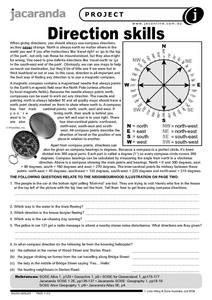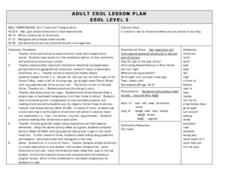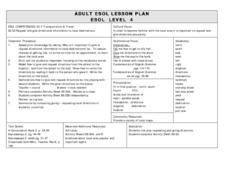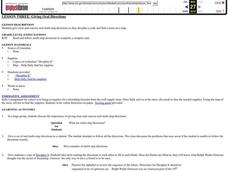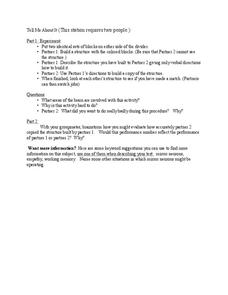Curated OER
Aim: Can I Identify and Use Imperative Verbs?
Different types of verbs are presented in this PowerPoint. Learners discover that imperative verbs are often used when writing instructions. For example: "First, fold the card in half, then cut a small slit," is a sentence that uses two...
Computer Science Unplugged
Marching Orders—Programming Languages
Computers need precise directions to complete a task. Class members experience what it is like to program a computer with an activity that asks one pupil to describe an image while classmates follow the directions to duplicate the picture.
West Contra Costa Unified School District
Solving Radical Equations
How can you make solving radical equations more engaging? Provide your math class with a hands-on activity that focuses on solving radical equations with flash cards. A warm-up and exit ticket flank direct instruction of the steps...
Curated OER
Giving Verbal Directions/ESOL
Students practice giving verbal directions accurately and employ correct prepositions and prepositional phrases and adverbs when giving those directions. They focus on using correct grammar, imperatives and infinitives when giving those...
Curated OER
Reading Skills - Giving Directions
For this reading skills worksheet, students identify places on a map. After reading a description of where each of the fifteen places is located, students match each building to the names of the places.
Curated OER
Sequential Writing
In this writing instructions instructional activity, learners use sequential order to write instructions for brushing their teeth. Students write what to do first, next, then, and finally.
Curated OER
Direction Skills
In this geography activity, students read an excerpt on what directions tell someone. They respond to 6 short answer questions related to the neighborhood illustration found on the second page of the activity.
Curated OER
Writing Directions for Mathematical Activities
Fifth graders reorganize comic strips to have them make sense, complete outline and organize their thoughts into outline form to explain directions,
and use that outline to complete their own directions for geometry activities.
Curated OER
Giving and Taking Directions
Learners identify the difference between commands and a declarative sentence. They complete a diagram with verbs, prepositions and numbers. They follow directions using a map and give directions to another location.
Curated OER
Asking For Directions
Students draw a map of their surrounding area using appropriate landmarks and identifying characteristics. Students ask for and give directions to locations found on their maps to their partner. This lesson is intended for students...
Curated OER
Is That Your Final Answer?
This unit on integers includes a pre-test, a post-test, four spreadsheets, and links to an interactive web-site to support the learning of integer operations. Access to computers and the Internet are imperative to this unit. The lessons...
Curated OER
A Primary Source Picture Book
Travel through Europe with ten-year-old Teddy Roosevelt in this writing activity, which uses the picture book My Tour of Europe: by Teddy Roosevelt, by Ellen Jackson. After reading the book, readers compare it to passages from The...
Curated OER
Missing: One Princess
Catalyze your classroom's creativity with this PowerPoint. It provides young writers with a general idea of a story about a missing princess, different characters, and step-by-step writing instructions from beginning to end. There are...
Curated OER
Sacred Giving- Why?
Students define the Jewish concept of tzedakah. In this religious lesson, students read portions of the Torah and discuss the meaning of tzedakah. Students visit a Jewish Community Center.
Curated OER
Requesting Directions
Students work with their partners to role play giving and receiving directions to familiar and unfamiliar places. Students practice verifying directions through verbal repetition. This lesson is intended for students acquiring English.
Curated OER
Giving and Taking Directions (Middle School)
Students describe the difference between a declarative sentence and a command. They complete a diagram verbs, prepositions and numbers. They follow directions on a map and create directions of their own to another location.
Curated OER
My Bank, My Budget, My Decisions!
Young scholars build a budget. In this philanthropy instructional activity, students write a personal budget that includes spending, saving, investing, and donating. Student philanthropists donate money to charities.
Curated OER
Got a Problem? Let's Solve It! Lesson 1:
Students investigate how problem solving skills contribute to philanthropy. In this animal welfare lesson plan, students use problem solving skills to make suggestions about how to solve an issue regarding the humane treatment of an animal.
Curated OER
What is a Hero? Heroism in Greek Mythology
High schoolers explore the tales of Greek mythology and discuss what it means to be a hero. They associate acts of epic heroism with philanthropy noting that these characters acted in a larger than life manner to secure the common good.
Curated OER
Finding Our Bonds: King Day
Students explore the concept of philanthropy. In this service learning lesson, students experience literature and participate in a simulation that examines discrimination, prejudice, and stereotypes.
Curated OER
Center Stage—Focus on Poverty
Young scholars explore the concept of philanthropy. In this service learning lesson, students examine stereotypes and discrimination based on socio-economic status. Young scholars prepare to work with people of diverse backgrounds in...
Curated OER
Giving Oral Directions
Young scholars provide oral multi-step directions when helping someone follow a route on a map. For this directions lesson plan, students read examples of directions and then practice giving them on their own.
The New York Times
A Guide to Political Donations
Voters determine the outcome of elections, but campaign donors can influence the attitudes of those voters. Explore nine examples of donors and the amounts of money they want to contribute, and the legal ways the groups can or cannot...
University of Minnesota
Tell Me About It
Have you ever tried following confusing or incomplete directions? In a hands-on experiment, partners give and follow directions to build a structure. Scholars apply their years of experience taking instructions to prove they know...








